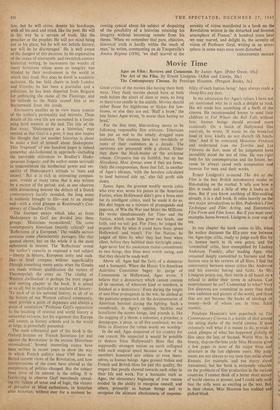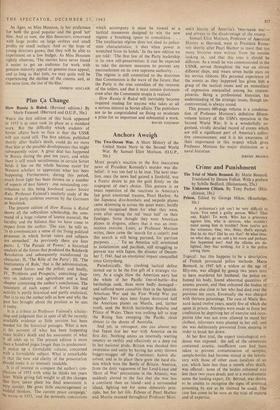Movie Time
The Contemporary Cinema. By Penelope Houston. (Penguin Books, 5s.),
GOOD critics of the movies like having them both ways. They think movies should burn at both ends before the altars of class or mass, so long as there's no candle in the middle. Movies should either flame for highbrows or flicker for low- brows, or else they are out. 'Half a brow,' the late James Agee wrote, 'is worse than having no head.'
For the first time, film-making seems to be following responsible film criticism. Television has put an end to the steady, drugged mass audience. The cinemas have lost two-thirds or more of their customers in a decade. The survivors are presented with a choice. Either they show the block-buster or the art-house' release. Cleopatra has its faithful, but so has Hiroshima, Mon Amour, even if the' are fewer. Only the compromises, those that fall, in another of Agee's phrases, 'with the heroism calculated to land buttered side up,' also fall profit side down.
James Agee, the greatest weekly movie critic who ever was, wrote his pieces in the American Forties, when Hollywood didn't give a brass cent for its intelligent critics, until he made it do so. His diet began on a mixture of propaganda and popcorn, of Win the War and Mulct the Millions. He wrote simultaneously for . Time and the Nation, which made him grow two heads, one faith, and no soft gut. For Time, he judged the popular film by what it could have been. given Hollywood, and wasn't. For the Nation, he judged all films by what they had been when silent, before they babbled their birthright away. Agee never lost his passionate moral commitment to two things, that films were worth seeing, and that they should be made well.
Above all, Agee had the faith of a democrat and a humanist. When the House Un-American Activities Committee began its purge of Communists in Hollywood, Agee wrote, 'I believe that a democracy which cannot contain all its enemiei, of whatever kind or numbers, is finished as a democracy.' Even during the height of anti-Hun propaganda in the war, he slashed at the patriotic poppycock on the documentaries of American heroism during the fighting. Such a soundtrack, in Agee's opinion, 'heckles and humiliates the screen image, and pounds it, like the nagging of a shrew, a salesman, a preacher, a demagogue, 'a pimp, or all five combined; we use films to illustrate the rotten words we worship.'
In the end, Agee despaired of his country for one reason. He suspected it would be possible to deduce from Hollywood's films that the supposedly strongest nation on earth collapsed with such magical speed because so few of its members honoured any others or even them- selves, as human beings. Agee praised Italian and French and British films for jtist this quality, the respect that people showed towards each other in their life and work. For a humanist such as Agee, the elementary beginning of true reason resided 'in the ability to recognise oneself, and others, primarily as human beings and to recognise the ultimate absoluteness of responsi-
bility of each human being.' Agee always made a cheap film pay dear.
In my admiration for Agee's values, I have not yet mentioned why he is such a delight to read. His wit made him something of a Swift of the cinema. He recommended horses to send their children to Foil Whom the Bell Tolls without fear; human beings should proceed more cautiously. On a batch of Hollywood film musicals, he wrote, 'If music be the breakfast food of love, kindly do not disturb till lunch- time.' And if he overrated Monsieur Verdoux and underrated Ivan the Terrible and Les l'isiteurs du Soir, most of his judgments have incredibly stood the test of time. He was right both for his contemporaries and the future, be- cause he always cared with compassion and humour for men and their works.
Ernest Lindgren's re-issued The Art of the Film is the best British introductory reader to film-making on the market. It tells you how a film is made and a little of why it looks as it does. But if you know anything of film-making already, it is a dull book. It relies heavily on the two major introductions to film, Pudovkin's Film Technique and Film Acting, and Eisenstein's Film Form and Film Sense. But if you want your examples home-brewed, Lindgren is your cup of tea.
In one chapter the book comes to life, when the author discusses the fifty-year war between the Agee-type critic, ready to judge each film by its human merit in its own genre, and the 'committed' critic, here exemplified by Lindsay Anderson. Frankly, after reading Agee, who remained deeply committed to fairness and the human race in his reviews of all films, I find the controversy between minor critics like Anderson and his enemies boring and futile. As Mr. Lindgren points out, their battle is all based on a refusal to define their terms in advance. Can entertainment be art? Committed to what? Very few directors are committed to more than their own ambition and picture of the world, and those that are not become the hacks of ideology or money—both of whom are, in time, fickle masters.
Penelope Houston's new paperback on The Contemporary Cinema is a scatter of shot among the sitting ducks of the world cinema. It does extremely well what it is meant to do, provide a quick glimpse of what. has happened globally to film since the last, or Second, World War. In a breezy, slap-on-the-lens style Miss Houston gives a few pages to most of the major films and directors in the last eighteen years. Her judg- ments are not always to my taste (too snide about Resnais, for example, and too starry about Antonioni), but her book is extremely valuable on the problems of film production in the various countries. I cannot think of a better short survey of world cinema at present, and I could only wish that the stilts were as exciting as the text. But, in their choice, Miss Houston has nodded and picked blind.
As Agee, so Miss Houston, in her preference for both the good popular and the good 'art' film. And so now, the film financiers, concerned with large profits on large outlays and small profits on small outlays. And so the hope of young directors grows, that they will be able to experiment on a low budget. As Miss Houston rightly observes, `The movies have never found it easier to get an audience for work with genuine minority appeal or genuine mass appeal; and as long as that lasts, we may quite well be experiencing the decline of the cinema and, at the same time, the rise of the film.'
ANDREW SINCLAIR































 Previous page
Previous page